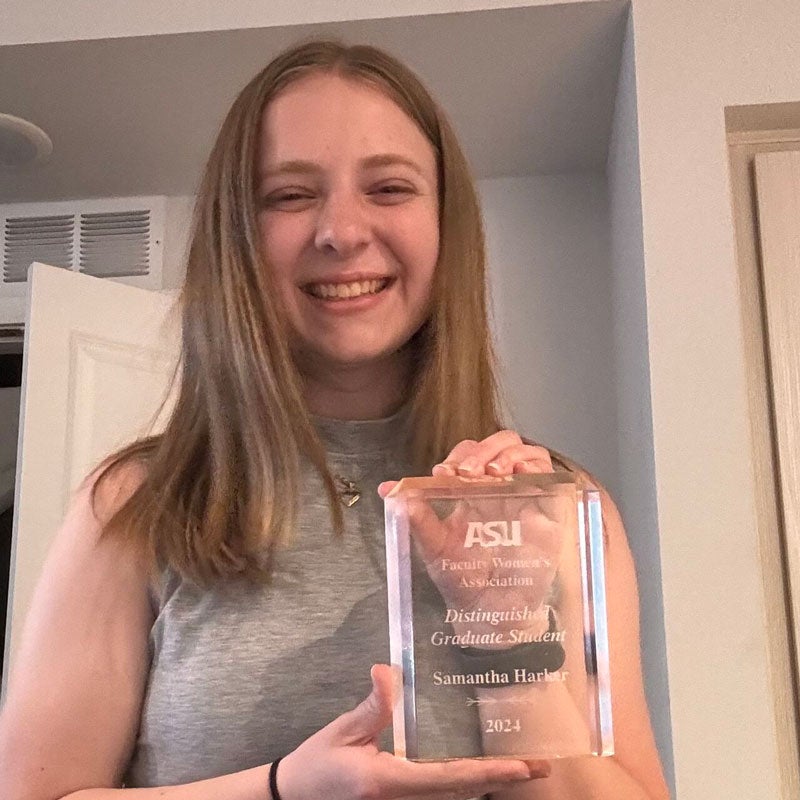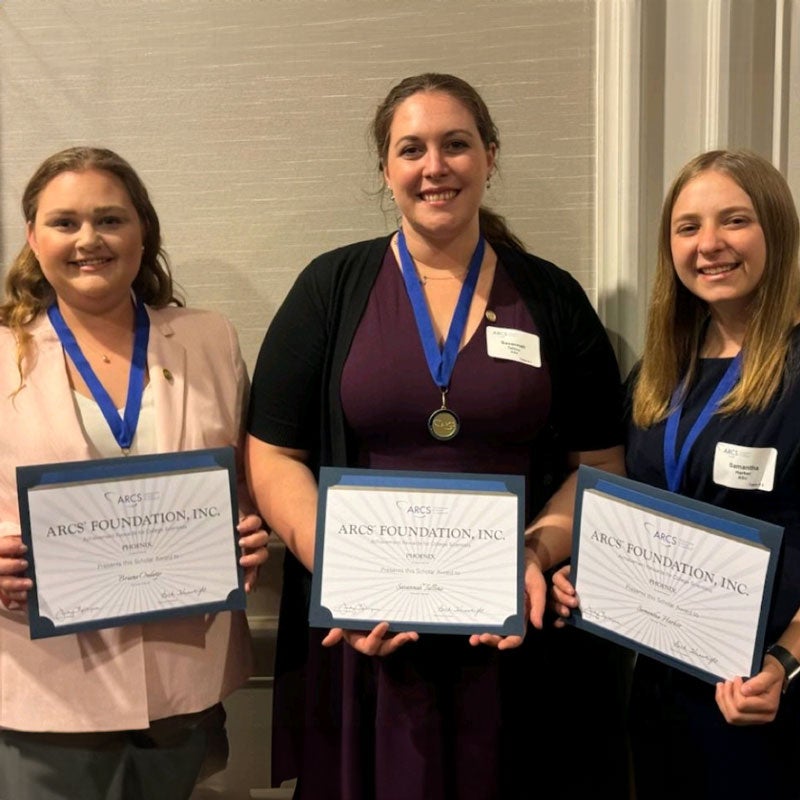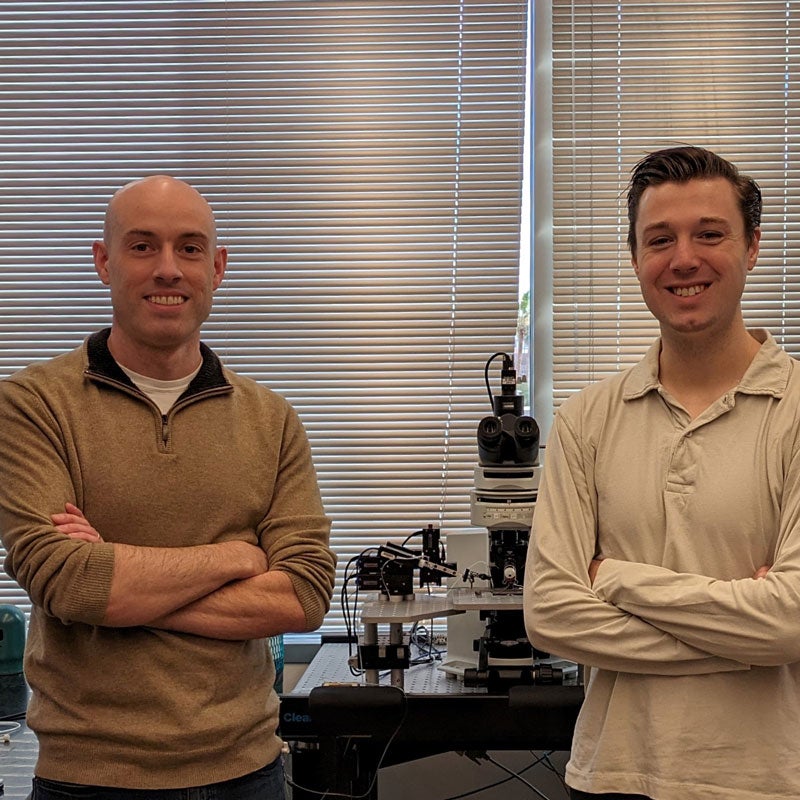Neuroscience, PHD
Degree Awarded: PHD Neuroscience
Neuroscience is the scientific study of the nervous system. Studies in neuroscience can be multifaceted and combine physiology, anatomy, molecular biology, genetics and mathematical modeling, with the aim of understanding the fundamental and emergent properties of the many different cells in the brain and how they interact and coregulate each other.
Students integrate several levels of analysis --- molecular, cellular, systems, behavioral and cognitive --- to investigate basic, translational and clinical questions about the relationship between the brain and behavior.
The Doctor of Philosophy program in neuroscience includes aspects of graduate-level training from many different units on campus and from the program's partner institutions distributed across the greater Phoenix area. Partner institutions include Barrow Neurological Institute, Translational Genomics Research Institute, University of Arizona College of Medicine-Phoenix and the Banner Sun Health Research Institute.
- Effectively communicate neuroscientific concepts, both orally and in writing.
- Execute an independent research plan of their own design that tests hypotheses related to neuroscience.
- Apply core neuroscientific concepts to address fundamental questions regarding nervous system function and associated pathologies.
Interdisciplinary Partners
The program’s interdisciplinary faculty consists of people from various schools and departments at ASU, and from outside organizations. Therefore, some faculty members are not physically located on any of the ASU campuses.
- Barrow Neurological Institute
- College of Medicine-Phoenix, Dept. of Basic Medical Sciences
- Translational Genomics Research Institute
Program Faculty PhD Students
Courses and electives
School of Biological and Health Systems Engineering
- BME 521 Neural Basis of Motor Control (3)
- BME 532 Prosthetic and Rehabilitation Engineering (3)
- BME 561 Clinical Neuroscience (3)
- BME 568 Neural Plasticity and Neurorehabilitation (3)
School of Life Sciences
- BIO 451/551: Cell Biotechnology Laboratory (4)
- BIO 465/598: Neurophysiology (3)
- BIO 515: Science, Technology and Public Affairs (3)
- NEU/BIO 598: Neural Development (3)
- MCB 555: Advanced Molecular and Cellular Biology (3)
- BIO 543: Molecular Genetics and Genomics (3)
- NEU 598: Neurodegenerative Disorders of the Aging Brain (3)
- NEU 598: Genetics and Genomics of Behavior (3)
- NEU 591: Biotechnology Viruses as Tools (3)
- NEU 591: Data Analysis and Visualization in R (3)
- BIO 514: Statistical Models for Biology (4)
School of Mathematical and Statistical Sciences
- APM 530: Mathematical Cell Physiology (3)
- APM 531: Mathematical Neuroscience I (3)
- APM 532: Mathematical Neuroscience II (3)
- APM 598: Introduction to Deep Neural Networks (3)
- APM 494/598: Data Analysis in Neuroscience (3)
Department of Psychology
- PSY 591: Neuroanatomy (4)
- PSY 528: Sensation and Perception (3)
- PSY 591: Neurobiology of Learning and Memory (3)
- PSY 591: Neuropsychopharmacology (3)
- PSY/NEU 598: Visual Cognitive Neuroscience (3)
- PSY 591: Neuroscience of Attention (3)
- PSY 591: Behavioral Neuroscience of Women's Health (3)
- PSY 591: Advanced Neurobiology of Cognition (3)
- NEU 591: Neurobiology of Social Behavior (3)
- NEU 598: Brain and Emotion (3)
College of Health Solutions - Speech and Hearing Sciences
- SHS 513 Neurophysiology of the Auditory System (3)
- SHS 519 Auditory Pathologies and Disorders (3)
- SHS 545 Speech Perception by the Hearing Impaired (2)
- SHS 567: Neural Bases of Communication Disorders (3)
- SHS 575: Aphasia and Related Neurogenic Language Disorders (3)
- SHS 576: Neuromotor Speech Disorders (3)
- SHS 598: Health Neuroscience (3)
Neuroscience PhD Student Highlights
Application and admission information
Applications open September 1 for admission in Fall of the following year. The application deadline is November 15. We accept applications for Fall semesters only. We cannot guarantee that applications received after the November 15 deadline will be considered for admission.
All applicants must apply by filling out ASU's Graduate Admissions application. All application materials must be submitted through the application or to Graduate Admissions directly. Please do not mail or email any documents to the School of Life Sciences.
Required materials and information include the following:
- 1-2 page personal statement
- An up to date CV or resume
- The names of relevant SOLS faculty you have been in touch with who you might be interested in being supervised by
- Unofficial transcripts and English proficiency test scores (if applicable)
- The names and emails of at least 3 recommenders to write you letters of recommendation
Following the November 15 deadline, faculty will begin reviewing applications. Applicants should monitor their My ASU priority tasks to ensure there are no missing materials in their application.
Faculty will decide which applicants they would like to invite to our Graduate Recruitment Weekends (GRWs), typically held in February. Applicants will hear from the School of Life Sciences in January if they are invited to participate in the GRWs.
Admission decisions will begin after the GRWs, and applicants typically receive final decisions by April 1.
Minimum requirements for admission include the following:
- Cumulative GPA of at least 3.0 on a 4.0 scale
- International applicants must satisfy university minimum requirements for English proficiency (TOEFL, IELTS, Duolingo, PTE)
- There are other ways to demonstrate English proficiency beyond the tests, so please refer to ASU's English proficiency webpage to review how you might satisfy requirements
Desired qualifications typically seen in competitive candidates:
- Research experience and a letter of recommendation from a faculty research supervisor
- English proficiency scores that meet these teaching assistant language proficiency requirements
Please note that the GRE is not required.
Students offered admission to a PhD program in the School of Life Sciences will typically receive a funding offer as well. While individual funding offers may differ to some degree, they typically include teaching assistant and/or research assistant positions each semester (summer optional) for 5 years. These positions provide financial coverage through the following:
- A standard salary stipend paid biweekly
- Tuition remission covering enrollment in 6-18 credit hours for fall and spring semesters and 1-14 credit hours for summer semesters
- Health insurance coverage
To discover more, check out the ASU Graduate College's funding opportunities!
Degree Requirements
Curriculum Plan Options
- 84 credit hours, a written comprehensive exam, an oral comprehensive exam, a prospectus and a dissertation
Required Core (8 credit hours)
BIO 610 Introduction to Responsible Conduct of Research (RCR) in Life Sciences (1)
NEU 556 Human Systems Neuroscience (4)
NEU 576 Cellular and Molecular Neuroscience (3)
Electives or Research (58 credit hours)
Other Requirements (6 credit hours)
NEU 558 Neuroscience Journal Club (1)
NEU 591 Seminar (3)
Culminating Experience (12 credit hours)
NEU 799 Dissertation (12)
Additional Curriculum Information
Students take NEU 558 three times for one credit hour.
Admission Requirements
Applicants must fulfill the requirements of both the Graduate College and The College of Liberal Arts and Sciences.
Applicants must have earned a bachelor's or master's degree from a regionally accredited institution.
Applicants must have a minimum cumulative GPA of 3.00 (scale is 4.00 = "A") in the last 60 hours of their first bachelor's degree program or a minimum cumulative GPA of 3.00 (scale is 4.00 = "A") in an applicable master's degree program.
Regular admission may be granted to applicants who have achieved the minimum cumulative GPA or higher in the last two years of work leading to a bachelor's degree and who are competitive in the applicant pool, as evidenced by letters of recommendation. Particular attention is paid to research experience and overall preparation in problem-solving, as evidenced by previous coursework and research experiences.
There are no specific undergraduate course requirements other than those implied by the degree requirements described above. Most students are expected to have completed coursework in biology, chemistry and math.
All applicants must submit:
- graduate admission application and application fee
- official transcripts
- academic record form
- personal statement
- curriculum vitae or resume
- three letters of recommendation
- proof of English proficiency
Additional Application Information
An applicant whose native language is not English must provide proof of English proficiency regardless of their current residency.
Research experience is a desired qualification.
Next Steps to attend ASU
Learn about our programs
Apply to a program
Visit our campus
Application Deadlines
Fall

Career Opportunities
Graduates with a PhD in neuroscience have strong preparation for academic careers at every level, from community colleges to research universities. Graduates also apply the skills and knowledge obtained in this program to government careers in federal and state agencies, in industry (biotech, medical or pharmaceutical), and in nongovernmental organizations.
Career examples include:
- biomedical or health care scientist in academic, biotech or industry labs
- K-12 science teacher (elementary or high school)
- principal investigator leading a research group in a government or nonprofit setting
- university or college faculty member (professor, lecturer, instructor, etc.)
Program Contact Information
If you have questions related to admission, please click here to request information and an admission specialist will reach out to you directly. For questions regarding faculty or courses, please use the contact information below.
- [email protected]
- 480/965-1768








